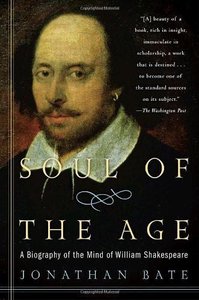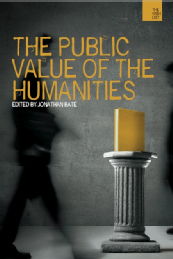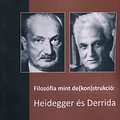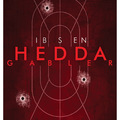Nemcsak a filozófusok gondolják úgy, hogy szükség van a bölcsészettudományokra.

Jonathan Bate neves Shakespeare-kutató.

Többek közt a nyitó illusztráción látható könyvnek is ő a szerzője. Nemrég nevezték ki az oxfordi Worcester College vezetőjének (provost). Nos, az újdonsült vezető nem csak irodalomtörténészként jeleskedik. Nem sajnálta az idejét arra pazarolni, hogy válogatást állítson össze a következő provokatív címmel: A humán tudományok közhaszna.

A kötet 2011 januárjában (más forrás szerint 2010 novemberében) jelent meg, s ismertetője szerint az adja létjogosultságát, hogy - idézem - : "A recesszió az a pillanat, amikor az értékre vonatkozó alapvető kérdéseket fel kell tenni." A kötet épp egy ilyen kérdéssel szembesít, a következő nemzetközi tudóstársaság írásai révén:
Mary Beard is Professor of Classics at the University of Cambridge and a Fellow of Newnham College; her many books include The Invention of Jane Harrison (2000), The Roman Triumph (2007) and Pompeii: The Life of a Roman Town (2008).
Iain Borden is Professor of Architecture and Urban Culture at University College London; his books include Skateboarding, Space and City (2001) and Manual: The Architecture and Office of AHMM (2003).
Christopher Breward is Head of Research at the Victoria and Albert Museum, London; he is the author of The Culture of Fashion (1995), The Hidden Consumer: Masculinities, Fashion and City Life 1860-1914(1999), and Fashioning London: Clothing and the Modern Metropolis(2004).
Ben Cowell is Assistant Director, External Affairs, at the National Trust, and author of The Heritage Obsession (2008).
Stephen Daniels is Professor of Cultural Geography at the University of Nottingham and Director of the AHRC Landscape and Environment programme. His publications include Humphry Repton: Landscape Gardening and the Geography of Georgian England (1999) and Paul Sandby: Picturing Britain (2009).
Nicholas Davey is Professor of Philosophy at the University of Dundee and author of Unquiet Understanding: Gadamer's Philosophical Hermeneutics (2006).
Chris Gosden is Professor of European Archaeology at University of Oxford; his books include Knowing Things: Exploring the Collections of the Pitt Rivers Museum 1884-1945 (with Frances Larson) (2007) and The Oxford Handbook of Archaeology (with B. Cunliffe and R. Joyce) (2009).
Robert Hampson is Professor of Modern Literature at Royal Holloway, University of London; his books include Joseph Conrad: Betrayal and Identity (1992), Cross-Cultural Encounters in Joseph Conrad's Malay Fiction (2000) and various editions of Conrad, Kipling and Rider Haggard.
Deborah Howard is Professor of Architectural History at the University of Cambridge and Fellow of St John's College, Cambridge; her books include Venice and the East (2000) and The Architectural History of Venice (revised edn, 2002).
Richard Howells is Reader in Cultural and Creative Industries at King's College, London; his books include Visual Culture (2003) and The Myth of the Titanic (1999).
Matthew H. Johnson is Professor of Archaeology at the University of Southampton: His books include Archaeological Theory: An Introduction(1999), Ideas of Landscape (2006) and English Houses 1300-1800(2010).
Michael Kelly is Professor of French at the University of Southampton and Director of the UK Subject Centre for Languages, Linguistics and Area Studies; his books include The Cultural and Intellectual Rebuilding of France after the Second World War (2004) and The European Language Teacher (2003).
Catherine Leyshon is Associate Professor of Historical and Cultural Geography at the University of Exeter. She has recently published an edited collection entitled Process: Landscape and Text (2010). Many of her publications are as Catherine Brace.
Rónán McDonald holds the Chair in Modern Irish Studies at the University of New South Wales; his publications include Tragedy and Irish Literature (2002) and The Death of the Critic (2008).
April McMahon is Forbes Professor of English Language and Vice Principal for Planning, Resources and Research Policy at the University of Edinburgh; her books include Lexical Phonology and the History of English (2000) and Language Classification by Numbers (2005). Will Barras, Lynn Clark, Remco Knooihuizen, Amanda Patten andJennifer Sullivan are her graduate students at Edinburgh.
Francis O’Gorman is Professor of Victorian Literature at the University of Leeds; his publications include Victorian Literature and Finance (2007) and The Cambridge Companion to Victorian Culture (2010).
Katie Overy is Director of the MSc in Music in the Community and Co-Director of the Institute for Music in Human and Social Development (IMHSD) at the University of Edinburgh; her publications include Dyslexia and Music: From Timing Deficits to Musical Intervention (2003) andBeing Together in Time: Musical Experience and the Mirror Neuron System (2009).
Mike Pearson is Professor of Archaeology at the University of Sheffield; he has directed excavations at Stonehenge, in the Outer Hebrides and Madagascar, and his many books include Bronze Age Britain (1993) andThe Archaeology of Death and Burial (1999).
Mike Press is Professor of Design Policy at Duncan of Jordanstone College of Art and Design, University of Dundee; his books include The Design Agenda (1995) and The Design Experience (2003).
Simon Szreter is Professor of History and Public Policy at the University of Cambridge and Fellow of St John's College; he is co-founder and editor of
www.historyandpolicy.org and has most recently published
Health and Wealth: Studies in History and Policy (2005) and (with Kate Fisher)
Sex Before the Sexual Revolution. Intimate Life in England 1918-1963 (2010).
Vanessa Toulmin is Chair in Early Film and Popular Entertainment at the University of Sheffield and Director of the National Fairground Archive; her publications include Electric Edwardians: The Story of the Mitchell & Kenyon Collection (2006) and Blackpool's Winter Gardens: The Most Magnificent Palace of Amusement in the World (2009).
Gary Watt is Professor of Law at the University of Warwick; he is the author of Equity Stirring: The Story of Justice Beyond Law (2009) and founding co-editor of the journal Law and Humanities.
John Wolffe is Professor of Religious History at The Open University; his publications include God and Greater Britain (1994), Great Deaths (2000) and The Expansion of Evangelicalism (2006).
Jürgen Zimmerer is Professor of African History at the University of Hamburg and Reader in International History at the University of Sheffield, where he founded the Centre for the Study of Genocide and Mass Violence. He is currently president of the International Network of Genocide Scholars (INoGS) and Senior Editor of the Journal of Genocide Research.
Mégpedig a következő formában. A szerkesztő egy ártatlan kérdéssel kereste meg kollégáit: "Képzeljen el egy olyan közalkalmazottat (civil servant), aki a kutatási költségvetés elosztásáért felelős! Képzelje el, hogy azt mondja: 'Soha nem gond elaludnom, ha az adófizetők pénzét orvosi kutatásra költöm, de igenis aggodalommal tölt el, ha a humán tudományos kutatásra költök. Szeretek ugyanis saját lovamon lovagolni, de nem remélem, hogy ezért fizessen az adófizető'. Ha azt képzeli, hogy egy ilyen közalkalmazott hallgatja, mit válaszolna?"
Az Oxford Today közli a begyűjtött válaszok 10 legérdekesebbjét. Ezek vázlatosan a következőképp hangzanak magyarul (szerkesztett, rövidített formában):
1. Humán tudományos kutatás nélkül nem állna rendelkezésünkre az Oxford English Dictionary, a Macmillan Dictionary of Art, stb. Pedig ezeket jó áron tudjuk értékesíteni a világban.
2. A humán tudományok a kritikai gondolkodást alapozzák meg, e nélkül pedig semmilyen innovatív munkát nem lehet végezni.
3. Ha George Bush és Tony Blair tanácsadói ismerték volna Erez Manela történeti kutatásait, a világ kevésbé veszélyes hely lenne.
4. A könyvterápiai kutatások (például haldokló rákbetegek esetében) azt mutatják, hogy az irodalom közhasznot hoz az egészségügy területén is.
5.Ha a közalkalmazott olimpiai szinten tudna lovagolni, mért ne támogatnánk? A nemzeti presztízs nem csak a sportra vonatkoztatható.
6. A "Britishness" és a "kulturális identitás" égetően aktuális politikai kérdését nem lehet jól megválaszolni a humán tudományos kutatások eredményei nélkül.
7. Mihez kezdhetünk az orvosi kutatások eredményeképp visszanyert egészségünkkel, ha nem olvashatunk könyveket, nem vitathatunk meg különböző eszméket, nem járhatunk színházba és moziba, ha nem fejlődhet gondolkodásunk, beszédünk és írásunk?
8. Ha azt hiszed, hogy a tudás luxus, teszteld, mennyibe kerül a butaság!
9. Russell logikai és nyelvi kutatásai előkészítették a mesterséges nyelvekről folyó diskurzust.
10. Egy szíriai kolléga le akarta fordítani a Gondolkodni című kötetemet. Azt mondta, az iszlám világnak szüksége van arra, hogy megismertessék a szekuláris filozófiával. Ha figyelembe vesszük, hogy a katonai változat hány milliárdba kerül, nem az én verzióm lett volna gazdaságilag hatékonyabb?
Nos, az olvasó döntse el, ha ő lenne a közalkalmazott, meggyőzték volna-e ezek az érvek.
Az Oxford Today cikke alapján: HHF








